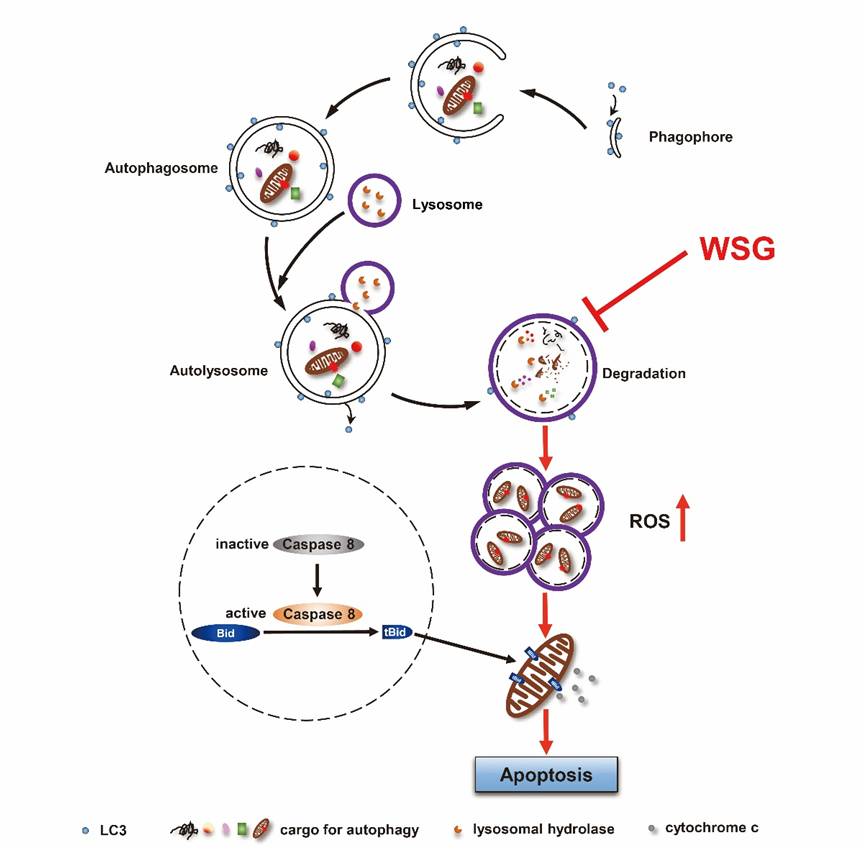Yeast β-D-Glucan Exerts Antitumour Activity in Liver Cancer as a Novel Autophagy Inhibitor
A recent study, published online in Redox Biology on March 7 of 2020, revealed a new antitumour mechanism of yeast β-glucan in liver cancer. The study discovered that water-soluble yeast β-glucan (WSG) is a novel autophagy inhibitor with significant antitumour efficacy through impairing autophagy and lysosomal function, promoting reactive oxygen species production and apoptosis. The research is performed by a research team led by Prof. YIN Huiyong from Shanghai Institute of Nutrition and Health (SINH) of Chinese Academy of Sciences.
As the most common primary liver cancer, hepatocellular carcinoma (HCC) ranks as the 4th leading cause of cancer deaths worldwide. Although surgical removal and targeted therapy were routine clinical practice for HCC treatment, increasing drug resistance becomes a major hurdle for chemotherapy. Thus, overall prognosis of HCC remains poor and development of more effective therapeutics for HCC is of critical importance.
Autophagy is an evolutionarily conserved catabolic process that can be induced under nutrient deprivation, hypoxia and diverse cellular stresses. The role of autophagy in the initiation and development of HCC remains poorly defined. Understanding the molecular mechanisms of autophagy at different stages of HCC may help to provide therapeutic targets for HCC treatment.
β-D-glucan is a polysaccharide composed of D-glucose monomers and is naturally found in bacteria, fungi, algae and cereal. Previous studies reported diverse biological effects of β-D-glucan, such as immune enhancement, antitumour, antioxidant and anti-hypertension.
The research team led by Prof. YIN discovered that WSG exerts significant antitumour efficacy on the inhibition of HCC cells proliferation and metabolism as well as the tumour growth in vivo. Mechanistically, WSG inhibits autophagic degradation by increasing lysosomal pH and inhibiting lysosome Cathepsins (Cathepsin B and D) activities, which results in the accumulation of damaged mitochondria and reactive oxygen species (ROS).
Furthermore, WSG sensitizes HCC cells to apoptosis via the activation of caspase 8 and the transfer of truncated BID (tBID) into mitochondria under nutrient deprivation condition. Of note, administration of WSG as a single agent achieves a significant antitumour effect in a xenograft mouse model and DEN/CCl4 (diethylnitrosamine/carbon tetrachloride)-induced primary HCC model without apparent toxicity.
Overall, this study reveals, for the first time, that WSG is a novel autophagy inhibitor with significant antitumour efficacy as a single agent, which has great potential in clinical application for liver cancer therapy.
This work entitled "Yeast β-D-glucan exerts anti-tumour activity in liver cancer through impairing autophagy and lysosomal function, promoting reactive oxygen species production and apoptosis" was conducted collaboratively by Prof. YIN Huiyong's team at SINH and Prof. WANG Qiang’s team at Institute of Food Science and Technology of Chinese Academy of Agricultural Sciences (CAAS). PhD student Ms. WANG Ningning from SINH and Prof. LIU Hongzhi from Institute of Food Science and Technology, CAAS, are the co-first authors for this work. Prof. YIN Huiyong, Dr. TAO Yongzhen from SINH and Prof. WANG Qiang are co-corresponding authors. The work also got the help from Prof. DING Wenxing at University of Kansas Medical Center, USA. It was financially supported by National Key R & D program of Chinese Ministry of Science and Technology (2016YFD0400205), the National Natural Science Foundation of China, and the Chinese Academy of Sciences.

A working model of antitumour effect of WSG by inhibiting autophagic degradation.
(Image provided by Prof. YIN Huiyong's team)
Media Contact:
WANG Jin (Ms.)
Shanghai Institute of Nutrition and Health,
Chinese Academy of Sciences
Email: sibssc@sibs.ac.cn
